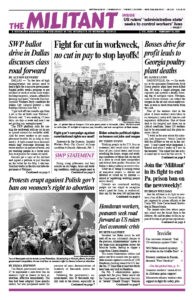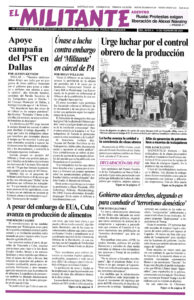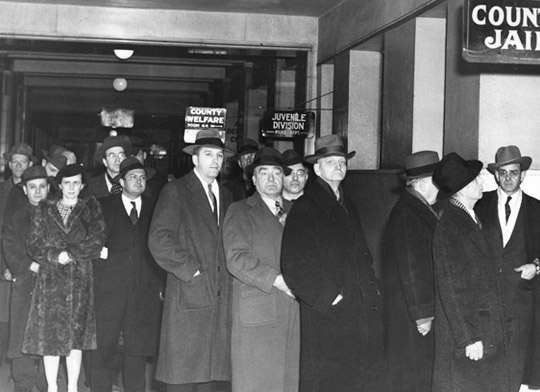Socialism on Trial: Testimony at Minneapolis Sedition Trial by James P. Cannon is one of Pathfinder’s Books of the Month for February. Cannon was the lead defendant among 18 leaders of the Socialist Workers Party and Minneapolis Teamsters union framed up in 1941. They were jailed for up to 16 months under the thought-control Smith Act. The U.S. government targeted them for organizing labor opposition to Washington’s drive to enter World War II. Cannon was a founding member of the communist movement in North America in 1919, dedicating his life to the fight to emulate the 1917 Bolshevik Revolution led by V.I. Lenin. He fought against Joseph Stalin’s efforts to bury Lenin’s revolutionary course, and became the central leader of the Socialist Workers Party. The excerpt is from the introduction by Joseph Hansen. Copyright © 2014 by Pathfinder Press. Reprinted by permission.
[T]he eighteen defendants in the famous Minneapolis “sedition” trial have been imprisoned. Fourteen are now at Sandstone penitentiary in Minnesota, three at Danbury, Connecticut, and one at the federal prison for women, Alderson, West Virginia. Prison gates closed on these socialists and trade unionists in “democratic” America despite the fact they were guilty of no crime other than exercising their right to free speech.
They were incarcerated because they opposed imperialist war, and because they advocated building a socialist society as the only means of ending such wars and all the other evils of capitalism in its death agony. The views for which they now sit behind bars are presented in this book, which is a reprint of the official court record of the testimony of James P. Cannon, America’s No. 1 Socialist and principal defendant at the trial.
Although the Minneapolis case was the first peacetime federal prosecution for sedition in the history of the United States, it was clearly engineered by the Roosevelt administration as part of its war program. The facts prove this beyond honest dispute. …
In addition to granting [Teamsters President Daniel] Tobin a personal favor, Roosevelt had a much weightier political reason for initiating prosecution. The administration, expecting momentarily to plunge the United States into the catastrophe of World War II, wished to isolate and silence the advocates of socialism so that their ideas might be prevented from gaining a hearing among the masses driven into the slaughter.
Swift action followed the White House assurance to Tobin. Just thirteen days later, on June 27, 1941, FBI agents raided the branch headquarters of the Socialist Workers Party in St. Paul and Minneapolis, carting off large quantities of Marxist literature, much of which could have been obtained in any public library.
On July 15, 1941, less than a month later, an indictment drawn up by the Department of Justice was handed down by a federal grand jury against twenty-nine men and women.
Count one of the indictment, based on an 1861 statute passed during the Civil War against the Southern slaveholders, charged a “conspiracy to overthrow the government by force and violence.”
Count two of the indictment charged: (1) Advocating overthrow of the government by force; (2) Publishing and circulating literature advocating this; (3) Forming organizations “to teach, advocate and encourage” such overthrow; (4) Becoming members of such organizations; (5) Distributing publications which “advised, counseled and urged” insubordination in the armed forces. This count was based wholly on the Smith “Omnibus Gag” Act, invoked for the first time in the Minneapolis case.
Like the infamous Alien and Sedition Acts of 1798 the Smith Act makes the mere advocacy of ideas a federal crime. Its constitutionality has been challenged by the American Civil Liberties Union, The Nation, The New Republic, and numerous others. The sponsor of this ultrareactionary law is poll-tax Representative Howard W. Smith, leader of the antilabor bloc in Congress and coauthor of the vicious Smith-Connally antistrike law.
On October 27, 1941, the trial began in the Federal District Court at Minneapolis. The principal government “evidence” consisted of innumerable quotations from articles in the American Trotskyist press going back to 1929. Public writings, public addresses of the defendants, radio speeches, leaflets distributed by tens of thousands — these were the main government proofs of “conspiracy.”
The government further introduced as evidence photographs of the great teachers of Marxism (including a portrait of Daniel DeLeon). It introduced such leaflets as the one advertising Vincent Raymond Dunne as speaker at a public forum on the action of the Trotskyists in combatting “20,000 Fascists in Madison Square.” In the indictment and in the prosecution arguments, the government flatly characterized as criminal the doctrines of Marx, Engels, Lenin, and Trotsky.
This infamous attack was met unflinchingly by the proletarian defense. Never before in a labor trial in this country have defendants so unswervingly, so consciously and so systematically defended their revolutionary program, utilizing the courtroom as a forum from which to proclaim it. The conduct of the defendants at the trial and throughout all the subsequent stages of the case belongs to the best traditions of international Marxism. …
This decision will undoubtedly go down as historic. Here is a peacetime law, manifestly unconstitutional, a law directly abrogating the right of free speech. The case is the first to be tried under this law. The President who appointed the judges is waging a war ostensibly to make the world free for democracy. The law has been universally denounced — even in the halls of Congress — as “enough to make Thomas Jefferson turn over in his grave” and as “without precedent in the history of labor legislation.” Yet the last court of appeal denies — without a word of explanation — the petition of eighteen defendants to hear their case! …
[Eugene V.] Debs spoke prophetically when he said: “They may put those men in jail — and some of the rest of us in jail — but they cannot put the socialist movement in jail.”


